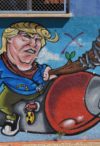Movements

The Chinese diaspora is compelled either to prostrate to an edifying project of assimilation to U.S. liberal democracy, or be branded as illiberal “Red Guards” unfit for serious political discourse. This discursive context has long mobilized overseas Chinese to affirm the universalism of Western liberalism in opposition to a Chinese despotism defined either by dynastic backwardness or communist depravity. Can overseas Chinese speak for themselves in the face of the West’s “hegemonic right to knowledge?” Or will all such speech that challenges U.S. presuppositions of liberal selfhood and Chinese despotism simply be tuned out as illiberal noise? | more…

How Social Class Influences Political Life
In order to understand what is happening in the United States, in the aftermath of the presidential election, one needs to comprehend the distribution of power in the country. | more…
A Sixth, Very Long Coup Attempt
U.S. sanctions killed tens of thousands of Venezuelans before the recognition of Juan Guaidó as interim president in 2019 led to even more murderous sanctions. The message is that tremendous economic pain will be inflicted on the country until Nicolás Maduro is gone. | more…

We who are engaged in the struggle for change might ask: “Through what lens of refraction is the evidence of events recalled and related?” If we are to resist the genocidal use of military force, and to oppose the environmental depredation that follows in its wake, we need to see the roots and laws of motion of colonialism and empire | more…

Today the political visibility of the Paris Commune is not at all evident. At least, that is, if what we mean by “today” is the moment when we have to take up the challenge of thinking politics outside its subjection to the state and outside the framework of parties or party.… And yet the Commune was a political sequence that, precisely, did not situate itself in such a subjection or in such a framework. [To tackle] the political facts and determinations of the Commune…[it is necessary to utilize] a completely different method…[than that of the classical interpretation]. | more…

A new poem by Marge Piercy. | more…

New!
Even if you don’t know much about the war in Vietnam, you’ve probably heard of “The Hanoi Hilton,” or Hoa Lo Prison, where captured U.S. soldiers were held. What they did there and whether they were treated well or badly by the Vietnamese became lasting controversies. As military personnel returned from captivity in 1973, Americans became riveted by POW coming-home stories. What had gone on behind these prison walls? Along with legends of lionized heroes who endured torture rather than reveal sensitive military information, there were news leaks suggesting that others had denounced the war in return for favorable treatment. What wasn’t acknowledged, however, is that U.S. troop opposition to the war was vast and reached well into Hoa Loa Prison. Half a century after the fact, Dissenting POWs emerges to recover this history, and to discover what drove the factionalism in Hoa Lo. | more…

Bill Fletcher Jr. and Bill Gallegos interview Fernando Gapasin on race, class, and building communities of solidarity. | more…

A new poem by Marge Piercy. | more…

A new poem by Marge Piercy. | more…

Writer, editor, and prison activist Susie Day has written a beautiful, heartrending, and inspiring account of the friendship between Paul Coates and Eddie Conway. Both were born in the late 1940s and grew up in Black communities—Paul in Philadelphia and Eddie in Baltimore. Both were members of the Black Panther Party in the late 1960s and early ’70s, and both were harassed by police for their radical activities as Party members. Eddie was wrongfully convicted of killing a Baltimore policeman and spent forty-four years in prison. Through it all, Paul was his steadfast friend and supporter, as well as partner in their political development and commitment to the liberation of Black people in the United States. | more…

In Socialist Practice, a collection of essays on leftist theory and experiences, Victor Wallis adheres to the view that the achievement of socialism is a drawn out, nonlinear process consisting of episodes that in many cases have a mixed impact on the revolutionary cause. He analyzes several, ranging from the seven decades of Soviet rule to the New Left of the 1960s. His main thesis is that over the last century pure socialism has never existed and that on all fronts socialist movements and governments have contained elements of the old—namely, capitalism. | more…










